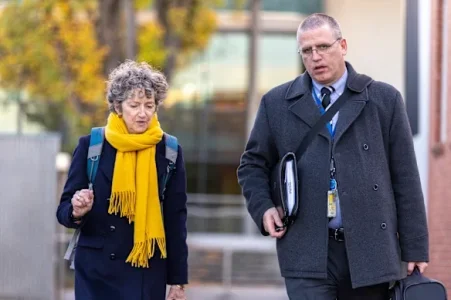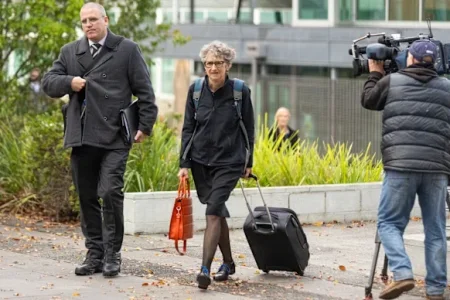I don't agree that it is unknowable. That is what trial's are for
I don't understand this blind deference to a jury trial verdict. Plenty of innocent people have been convicted by a jury. And even if someone is actually guilty, a verdict doesn't necessarily mean every aspect of the prosecution's case has been proven to be true.
Someone's state of mind is fundamentally unknowable, IMO. You can make reasonable inferences about it, but you may never actually know for sure. But that might just be a philosophical difference between us.
There were a few obvious motives that became evident. Basic ordinary ones, like a woman and mother going through divorce and wanting no interference from her ex and his family. She took the kids out of the religious school and moved them further away from her in-laws---seemed like she was moving on from them.
It also became apparent that EP was a habitual, if not pathological liar. And she had anger issues that we saw pop up. It created the possibility that she had emotional disorders which would mean she did not need a logical or rational motivation to do this compulsive act. IMO
This is an extremely weak argument for a motive. Even the prosecution admitted (in opening statements) it didn't have a motive for Erin. In those circumstances, I'm pretty comfortable stating there wasn't a motive. A motive isn't required for a conviction, obviously, but lack of motive is evidence against intent.
I agree with you about the lying though. I suspect it was basically what caused the jury to land on guilty. If you don't believe anything Erin says, all you are left with is the prosecution's murder narrative, which as I've admitted before is very compelling when zoomed out.
Intent was shown in several ways.
--Buying the dehydrator but then lying about it's very existence. And tipping it.
--Spending so much time learning to 'hide' mushrooms in people's food in order to fool them.
--Looking up info about Death Caps but then claiming she accidentally picked some ---
--Picking wild mushrooms but never identifying them or checking them for safety, just putting the in her pantry to serve to others
--Lying to the guests about her cancer scare in order to lure them to her luncheon
--Then lying about her scheduled bariatric surgery to explain her Cancer Lie
--Making sure her kids are not at the lunch, to protect them, then backtracking later and denying she did so
--The mismatched plates
--Pretending to have 'explosive poo' every 10 minutes, but then putting on white pants to go on a 3 hour road trip
--Feeding her kids the leftovers, even though she knew her lunch guests were severely ill
--Lying to the Doctors, CPS and Public Health officials about the source of the poison
--Making up stories about the elusive Asian Market full of deadly dried mushrooms
And I'm sure there is more...
Thanks for the list (not sarcasm, it's actually useful to have everything laid out). That's essentially what the prosecution did at trial: Zoom out, provide a long list of circumstantial evidence and ask the jury to fill in the gaps. The problem with that approach is it encourages hindsight reasoning (working backwards from an intended result).
When you actually examine these items, a lot of them are either irrelevant, incorrect, or have an alternative benign explanation (granted, you need to believe some of what Erin said to accept those explanations. As above, I understand why some people might not do that).
For example: The cancer story. You say Erin lied to her guests about having cancer "in order to lure them to her luncheon", but that's incorrect. The only testimony we have about the cancer is Ian's, and he said Erin did not mention it until after everyone had finished eating. Erin didn't need the cancer story to "lure" people to lunch, by all accounts they came willingly. That is, except for Simon, who Erin did tell she had medical news. She didn't say cancer though.
Another example: The plates. First of all, Ian's story about the plates hasn't been proven. The police search of Erin's house didn't show plates matching Ian's description, and Erin's son's police interview disagrees with Ian too. But more importantly, it is totally reasonable to conclude Erin just didn't have 5 matching plates. Simon confirmed she had mismatching plate sets under cross-examination. Personally, I don't have 5 matching plates in my house either. If I was serving a meal for 5 people, I would definitely give my guests the matching plates and eat off the odd one myself. Erin's behaviour here is only suspicious if you already assume she is guilty. It's just not relevant.
One more, just to illustrate what I categorised above as something with a possible benign explanation: The Asian grocer. Erin's testimony was that, as far as she knew, she did use dried mushrooms from an Asian grocer in the meal, and so that's what she initially told medical staff. It was only later she realised she might have accidentally use foraged mushrooms as well. You might not believe Erin's testimony, but for me her story is more plausible than the prosecution's contention that Erin deliberately led authorities on a wild goose chase for purchased mushrooms so she could cover up the murders. As I've said before, if Erin was trying to cover up murders she would have immediately admitted to foraging.
They blew her story apart, imo. She looked very much like a deceitful, dishonest person.
Disagree. The prosecution didn't blow Erin's story apart, if nothing else than because it didn't have the opportunity to do so. You might say that's not fair, but that's how criminal trials work.
She should have done so. She probably would not have been charged with murder if so.
Why didn't she do so since she DID, in fact, serve them foraged mushrooms. Do you have a theory why she didn't just own up to her mistake?
I have one. I think she has some personality disorders which made it hard for her to admit anything. She wanted to walk away free. No accountability. That was her goal, imo
I don't need to come up with my own theory about why she didn't immediately own up - the defence presented one. Once Erin realised there might have been foraged mushrooms in the meal, she panicked and tried to shield herself from allegations of being a danger to her kids.
As above, if Erin had wanted to "walk away free", she would have admitted foraging, not lied about it.
That was months ago. She may not have had her plan fully thought out yet. At the time she was just ibuying a kitchen appliance. She did not think it through apparently.She had no idea it would/could tie back to her.
That's not consistent with the prosecution's case though. The prosecution said Erin deliberately harvested death caps and purchased the dehydrator on that same day, it wasn't just an innocent household purchase. You can't have it both ways.
How many mass murders have you followed? It is entirely 'normal' for the perpetrator to have an organised, methodical plan, but somehow messes up here and there. So it makes total sense to me.
She overlooked the importance of the dehydrator because she underestimated the hospital's ability to focus in on death caps so freaking quickly. It did put her in a tail spin because she had not planned for that.
I agree, it is normal. But that's not what the prosecution alleged here. There wasn't just a couple of little mistakes, there was a whole litany of bizarre actions that directly contradict the prosecution's story of Erin as a calculating person who planned the murders for over a year.
I've thought about this some more, and I think there might be a case to be made that Erin was actually a bumbling idiot type killer. Someone who did things on the fly and never thought much about what story she needed to tell to get out of it or what evidence to dispose of. She might even have just meant to make her guests sick rather than kill them. That would at least be consistent with the facts. The problem is, that's not what the prosecution alleged.




